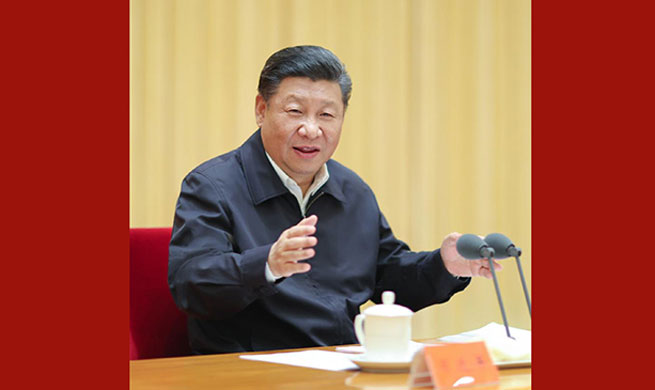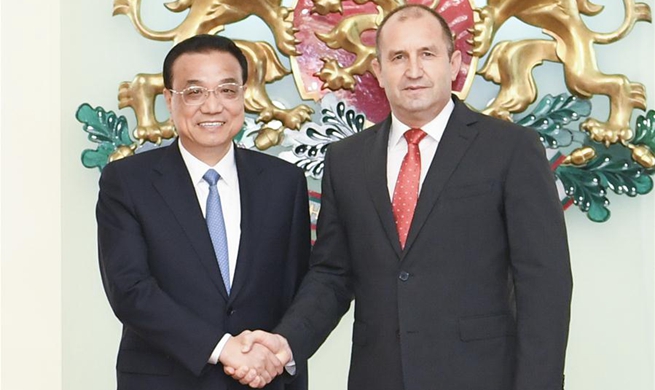RIYADH, July 6 (Xinhua) -- "I buy things on JollyChic many times, because of its cheap price, good quality and fast delivery," said Lima Khalid, a 25-year-old Saudi Arabian female employee at a local company.
Don't be mistaken. JollyChic is not a Saudi online shopping site; rather, it is an online retailer operated by a Chinese e-commerce company named Jolly Information Technology Co. LTD based in China's eastern city of Hangzhou.
JollyChic is so popular that it has become the top e-commerce company in the Middle East, including Saudi Arabia, with more than 35 million registered users by the end of 2017.
"JollyChic is popular across the country, and nearly every online buyer here knows it," Abdu Lahman, a student at King Saud University, told Xinhua.
JollyChic is just one example showing the footprints of Chinese e-commerce companies in the Middle East, where online shopping is a fast growing market.
BUILDING ONLINE SILK ROAD
Manufacturing is rarely based in the Middle East oil producing countries, such as Saudi Arabia and the United Arab Emirates (UAE), which largely depend on importing daily necessities from overseas.
Through cooperation with local enterprises, Chinese e-commerce companies such as JollyChic have been successful in the recent years in building an online Silk Road linking China with the Middle East.
They have earned profits while benefiting the customers in the Middle East, allowing them to buy inexpensive and fine products at home.
In a JollyChic warehouse in the Saudi capital of Riyadh, commodities were put in order to be sent to households, including Chinese-made clothes, shoes, bags, home decorations and appliances.
"JollyChic entered Saudi Arabia in 2013, and topped local online shopping market just in a few years. Besides advanced data process technology, warehouse establishment and cooperation with cyber celebrities is crucial to marketing," said JollyChic's CEO Li Haiyan.
In order to promote JollyChic, the company makes use of the social media in the region and cooperates with more than 1,000 online celebrities to promote its brand to over 60 million customers.
As mentioned by Khalid, JollyChic is usually the top choice for many customers in Saudi Arabia to buy stuff online, as products on the website are attractive in both quality and price, in addition to its fast delivery service.
In Riyadh, Jolly set up warehouses of more than 100,000 square meters, with a stock of over 15 million pieces of commodities and able to deal with up to 1.4 million items in a day, Li said.
Such warehouses enable Jolly to shorten the delivery time to two days from the previous 10 to 15 days, Li said.
"By 2020, the company plans to construct warehouses with more than one million square meters, with a capacity of storing 100 million pieces of commodities and processing 800 million pieces in a year," said Li.
Abdul Aziz, a Saudi reporter, explained that the majority of Saudi Arabians is low- and middle-end consumers, who enjoy buying quality goods with more reasonable prices online.
"We like the Chinese-made goods as they are with good qualities and acceptable prices," Aziz said.
Li said at the real shops in Saudi Arabia, low- and middle-end commodities are also usually made in China, but JollyChic has price advantages.
Therefore, JollyChic's annual sales have been growing year by year, and now more than 200,000 pieces are sold every day.
Encouraged by its success in Saudi Arabia, JollyChic has also expanded its business to neighboring countries, including Jordan, the UAE and Bahrain. JollyChic has already set up similar warehouses in Dubai and Bahrain.
CREATING JOBS AND PROSPERITY
The success of the Chinese e-business firms in the Middle East has also created a lot of job opportunities for Middle Eastern countries, and helped spur the local economy.
In the Middle East, half of the top 10 e-business companies are from China. These Chinese companies are estimated to have created more than 5,000 jobs to local communities.
Jolly employed 600 local staff in Jordan, 350 in Saudi Arabia, and about 100 in the UAE and Bahrain.
Sulaiman Azmi, a Saudi employer and manager of the human resources of Jolly's Saudi branch, said Saudi Arabia is seeking ways to help young people find jobs, especially for women who are hard to find jobs in the conservative nation.
Jolly hires women for positions of copywriter, designer and accountants, thus training a number of professionals for some countries in the region, Azmi said.
Li expressed confidence about Jolly's future development in the Middle East, which will prosper in e-commerce thanks to the continued inflow of capital and the creation of new start-ups in the region.
Last year, UAE real estate group Emaar Properties announced the investment of 1 billion U.S. dollars in creating a Middle East version of China's Alibaba Group, a world's leading online retailer, Internet and artificial intelligence company.

















